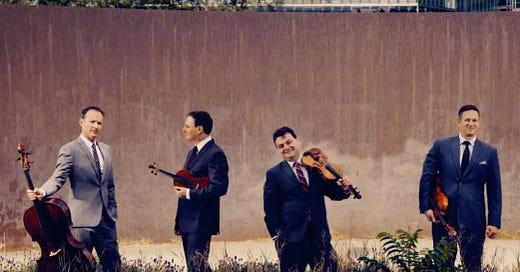War has a way of dulling the senses for those of us fortunately distant from its horrors. Each morning during the past two months, I have reached for dreary beige sweaters and faded jeans from my closet. Ben & Jerry’s has tasted excessively sweet. Some days, I have been stunned by the blazing blue sky.
Listening to music has been beyond my sensory capacity. Unlike the pre-war days, when I delighted in having an old record spin as I cooked for Shabbat, or sang along with Spotify on my morning commute, I have been leading a quiet existence.
But this week, I decided it was time to turn off the mute button this war switched on, and attend a performance of one of my favorite chamber music ensembles, the Jerusalem Quartet. I first encountered the Quartet shortly after I arrived in Jerusalem in 1999, several years after its four, teenaged string players had been brought together by the Jerusalem Music Center, an institution founded by legendary Jerusalem mayor Teddy Kollek and violinist Isaac Stern, to develop and showcase Israeli musical talent. Now, nearly thirty years later, the ensemble is one of the world’s leading string quartets.
Going to a Jerusalem Quartet concert in Jerusalem is like rooting for the home team. We local fans take pride in having watched the musicians grow up and grow together. We consider them “our boys”—like our soldiers, but without the accompanying fear. And this being Israel, many of us have personal connections to the Quartet. I often prepare the Hebrew-English translations for their concert programs, and I inevitably run into the cellist’s mother, my daughter’s former cello teacher, in the concert hall balcony.
This week’s venue was the Jerusalem International YMCA’s Friendship Hall, an auditorium designed (with wishful thinking it now seems) with cross, crescent, and star of David motifs to symbolize the unity of the three monotheistic faiths. As I took my seat, I recalled one of the last Jerusalem Quartet performances I attended here. It was March 2022, shortly after Russia had invaded Ukraine, and the Quartet—three out of four of whom are immigrants from the former Soviet Union—offered a soulful rendition of a Ukrainian hymn as an encore.
The pieces on this evening’s program—Mendelssohn and Ben-Haim’s first string quartets, and Brahms’ third—were invitations to transcend the sobriety of war, whether experienced in Kyiv or Jerusalem. Mendelssohn’s lyrical melodies, Ben-Haim’s intricate textures, and Brahms’ lush sonorities roused and transported me.
One movement of the twelve, the second movement of the Mendelssohn quartet, was more than a welcome distraction. Written as a canzonetta (with the character of a light song), it is built on a simple, enchanting melody. Episodes breeze in and out. Folk dances, animated by staccatos and pizzicatos, flutter. Everything moves with breathtaking delicacy, like the brush of a butterfly’s wing.
Thanks to Mendelssohn and the Jerusalem Quartet, I was reminded that even during harsh, hardening times of war, delicate beauty exists. Music has the power to evoke what war destroys, which, perhaps, is the first step toward the rebuilding.





“Time to turn off the mute button...” - love that.
I saw Isaac Stern last spring in Rhinebeck, NY where he introduced another young musician he’d mentored, violinist Jennifer Koh. As I read your newsletter, I felt the power of music to connect us to people, like you, who are far away and on my mind daily.